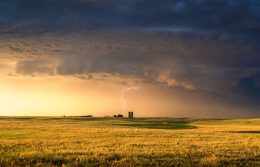Your Emergency Evacuation Plan
Hurricanes are remarkable forces of nature, capable of laying ground to some serious destruction whether you live along the coast or not. These storms have been known to cause damage as far inland as several hundred miles from the shoreline, producing high winds, tornadoes, heavy rains, landslides, floods, and microbursts for days after the event.
According to the Texas Hurricane Center, hurricanes are the most devastating and damaging natural disaster that impacts the United States, accounting for 65 percent of insured losses from natural disasters in the U.S. over the past half century.
Despite these storms’ destructive history, many Texans write them off in lieu of tornado preparedness and heat wave preparations, not realizing that the worst time to prepare for a hurricane evacuation is once the sirens are sounding.
If disaster strikes and you are forced to evacuate your home, you won’t have much time to assemble your most essential belongings. The Texas Department of Public Safety recommends you stash as many of the following items as possible into one bag you can quickly grab and exit with in a crisis.
Your Evacuation Plan
It’s important to have a destination in place — a friend or family member’s house, a pet-friendly motel, or a shelter — and make sure each family member knows where to meet and what they’re responsible for (who is getting the pet, who is getting the emergency supplies?).
Make sure to plan multiple escape routes to get there, too. Along with the approved government evacuation route, it never hurts to plan out a few backups in case of weather complications or traffic jams. Fill up your gas tank as soon as you’re aware there’s a risk you’ll need to evacuate.
Your Evacuation Kit
- Copies of important documents in a gallon-sized zippered bag: marriage certificates, birth certificates, passports, driver licenses, prescriptions or medication lists, vaccine records, wills, home deeds, and insurance policies.
- Cash ($100 recommended for a family of four) and checks.
- A week’s worth of all prescriptions and over-the-counter medications needed.
- Maps and an address book with important phone numbers.
- A charged phone and spare phone charger.
- A first-aid kit, toiletries, and personal hygiene items.
- Jumper cables, a battery-operated portable radio, a flashlight with extra batteries, and other supplies.
- Food and bottled water for each family member and pet for three days.
- Supplies for your pet: a traveling bag or crate, water and canned or dry food for three days, feeding dishes, paper towels or litter in a disposable aluminum roasting pan, garbage bags for waste, medicine and medical records, a leash and collar, and recent photos in case you are separated.
Your Property Checklist
- Turn off the water and the power.
- Shut off your propane tank and unplug electrical devices.
- Board up windows; have these purchased and stored away well in advance, and install anchors for the plywood and drill holes in the boards ahead of time to save as much time as possible.
- Lower your fridge and freezer to the coldest setting so your food stays fresh even if the power goes out.
- Bring inside all lawn furniture, trash cans, bikes, and anything else the wind might pick up.
- Use sandbags to create a barrier to your house.
- If there’s time, have a professional install check valves in plumbing that can prevent flood-water backup.
© 2017 Texas Farm Bureau Insurance



